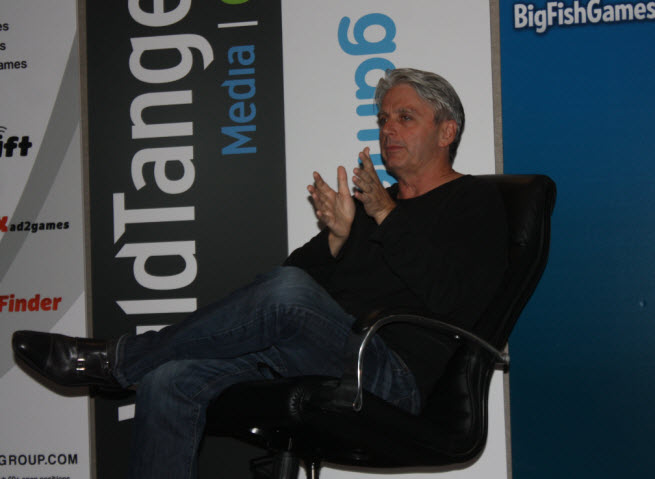Gaudiosi: Given that, is there a role for a scale publisher today in mobile?
Riccitiello: There was an announcement today, or I guess last night, about Facebook becoming a publisher in mobile. I think a lot of people can misunderstand publishing and what it is. For good or for bad, I had the pleasure of publishing about $50 billion worth of games. People have a concept in their mind of what publishers are, but publishers are actually pretty simple things.
They do three things. One, they provide capital to develop games with content creators. They don’t always provide capital, but providing capital is a key and valuable thing in the creation of content. That’s what Hollywood studios do, and that’s what game publishers have done for console and PC.
The second thing they do is they turn content into money. They are the point of transaction. Back in the retail days, they had 30,000 points of retail distribution, aggressive marketing, and plug-ins for television and advertising. Today, and I’m going to come back to that in a second, is there anybody operating as a publisher that actually converts content into money for the creator of the content?
The last thing they do is they provide an editorial service. In other words, they use some level of judgment based on past history as to what might work and might not work. Part of that is just the allocation of dollars, but sometimes it’s coaching or advice as to what might be more successful or not successful.
Both ends of the spectrum, if you will – the capital, the editing – are much the same, if you were to imagine yourself a publisher interacting with a developer. You can provide capital. You can choose where to apply it and what advice to give. I think the center section, around turning content into money, is a much more amorphous concept in a digital world. There are lots of players out there providing analytics, ad marketplaces. You have Facebook to provide connected users. But it doesn’t actually convert into meaningful revenue unless you have a product that generates daily revenue, that does that whole lifetime value thing that retains the consumer. A publisher cannot do that for a developer. A developer has to create a product that the user wants to come back and play every day.
I do believe that there will be people posing as publishers. Some people will be doing a lot of publishing value add. But in terms of being entirely responsible for converting content into revenue, I don’t think that’s going to exist in the same way. The developer needs to be involved in that process in a very significant way. Maybe someone will funnel users to them, but nobody else other than the developer can do the rest of the job. They need to make their product sticky. They need to make a product that people want to pay to play.
So I think there is going to be a different dividing line. I don’t know if the word “publisher” will be the best word to describe it. There will be people out there adding value in that scenario, but the full publisher concept seems to be less applicable than you might otherwise want to imagine.
Gaudiosi: Speaking of that added value, what opportunities are there today for mobile players doing ad marketplaces, analytics, and game engines?
Riccitiello: I’m going to jump through that question with an observation. If you look at the marketplace for stocks, Apple and Google. Since the advent of Android and the advent of iOS, these companies, between them, have added about $350 billion in market value. I would argue that at least half, if not tw-thirds of that, is directly a result of the mobile and tablet ecosystem they created. $300 billion in market value.
Now, all of you have heard the old saw about how content is king. Apple and Google aren’t great at content. They created a distribution platform for the content that most of you guys create, and they garnered $300 billion of value in doing so. Looking at the entire mobile ecosystem, you’ve gained your 70 or 75 percent of all the monetization on iOS and Android. The best I can come up with is that there might be $20 billion to $25 billion worth of shareholder value having been created on the other side of the equation, the side of the equation that is content. So arguably, it’s 10:1. Ten times more value has been created by a platform creator than has created by the content that goes over that. That wasn’t the case in console. It wasn’t the case in PC. It’s absolutely the case in mobile today.
I do think that there are smart players in that middle layer that will help developers monetize better – more rapidly, with more knowledge about their games. That is the key to righting the ship. There should be $100 billion or $200 billion or $300 billion worth of value on the other side of the equation. It won’t all go to games, but a big chunk of it needs to go to games.
In other words, as content developers, saying “content is king”? That’s a joke right now. Right now distribution is king. That’s where the money is being made. That’s where the value is being created. I think we can right that over time. We’re going to want to see these players in the middle be successful, because the alternative is that all those analytics, all that other stuff, will be entirely dependent on iOS and Android, and that’s a world where $400 billion worth of value gets created by the distributor, with very little left over for content creators.
From my vantage point, there’s a lot of value being added by everybody from a Unity, on the engine side, through the ad marketplaces like ChartBoost and the guys that do analytics in the middle, Contagion and many other companies. There’s a lot of value being added there. That needs to liberate the equity value that Apple and Google have soaked up and bring some of that more effectively to content developers.
Gaudiosi: What do you think the mobile industry can learn from console games?
Riccitiello: First off, mobile is growing at an infinitely better rate than console right now, so I’ll be careful on this point. But I visited with many mobile developers during the time I was at EA and in the time since I left EA about four months ago. One thing I’ve heard over and over again is, “We’re a mobile developer, a mobile content creator, but we’re going to bring console-level graphics to the mobile experience. That’s going to make us different and better. We’re going to hire people to do that.”
I think that’s a mistake. I go back to the time I was launching console and PC games. Investing in better graphics without figuring out what incremental or better differentiated gameplay goes with those graphics — in other words, rewarding the user with a better game, not just a prettier game – is a road to ruin. Prettier games cost more to make. Better games satisfy consumers.
If you go back to 1997 and 1998, a lot of game genres – RTS in particular, and some of the strategy games – all went to 3D. They doubled and tripled their development costs, but they didn’t fundamentally alter their gameplay. Revenue remained about the same. Development costs tripled. Everybody in the flight simulation business, the Jane’s type things and a few other guys in those businesses, RTS and so on, that hurt them really badly.
The companies that figured out how 3D would enable entirely new gameplay, these guys did really well. Action-adventure games, they weren’t really possible with sprites and isometric 2D types of game experiences. Going over to 3D sports games brought the same thing – fundamentally new game experiences.
If I were to come up with one bit of advice, as you’re looking at more powerful CPUs and GPUs in phones and tablets and you see that as an opportunity to create something that’s better-looking, think more about how that creates the opportunity to build an experience that you’ve not seen before, that is a different kind of gameplay. Some of them will be realtime gameplay mechanics. What do you unlock when you go to 3D, which is a lot more expensive to produce? What gameplay mechanic wasn’t possible before, or was fundamentally sub-optimized before? If you can answer that question, the investment is worth it. If you can’t answer that question, like the console folks before you, I think all you’ll find is that you spent more money to generate the same revenue. Eventually that doesn’t work very well.
Gaudiosi: If we were to flip that, what can the console industry learn from what’s going on in mobile?
Riccitiello: I’ll have two and a half answers to that. The first thing is, I spent a decade preaching simplicity and why we needed to make console games and PC games more accessible. I can say that we made this much progress, and it looks like a lot, but the progress we needed to make was a mile long. The console guys, with some exceptions, spent way too much time looking to the guy that writes the code and the marketing guy that plays the games as their target audience, and not recognizing that we were serving 200 million people in a world of 2 billion potential gamers. What got in the way was complexity.
Complexity and depth aren’t the same thing. I finished BioShock Infinite a couple of weeks ago. That’s a profoundly simple game to play. But it’s a profoundly deep game. It’s done very well. My point is that if we can learn anything for console and PC by looking at mobile, it’s radical simplification. Make it easy to get into. I don’t mean give up the depth, but make it simpler to access and get inside.
There are a lot of things I could say about how you can fashion business models. I would start by saying, though, that I don’t think microtransactions are going to be our only available model going forward. It’s clearly the dominant model in mobile right now, but remember – that has a game design question. In every mobile game that uses microtransactions as a business model, they’re also using microtransactions as a gameplay mechanic. You are managing resources as part of the game design. I don’t know if that’s the best business model for everything. I don’t know that I want to play a story-based game where I’m paying as I go as much as I do other types of games where I love to pay as I go.
I would say that the first thing is, console and PC guys should look at the model that’s going to make games accessible. But don’t mimic the business model to the point of slavery. It’s not going to be the only business model out there. The trends look like it, but it’s not going to end up that way.



